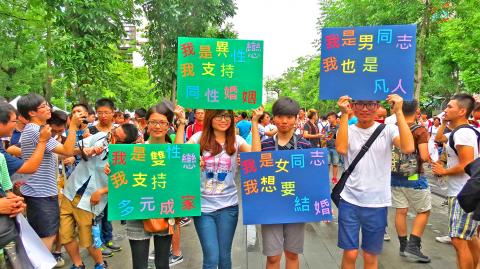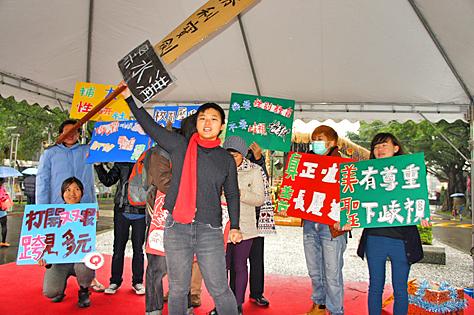Having a romance, joining a school club and getting a part-time job are said to be three required courses for all Taiwanese university students. Since the academic year has just begun, it is time again for students to choose a club to join. For lesbian, gay, bisexual and transgender (LGBT) students, however, universities continue to use technicalities to block the establishment of LGBT student clubs.
As the Gender Equity Education Act (性別平等教育法) states: “Schools shall provide a gender-fair learning environment, respect and give due consideration to students, faculty, and staff with different gender, gender temperaments, gender identity, and sexual orientation.”
The fact that the government and schools fail to ensure a fair learning environment for all has clearly highlighted the necessity of such clubs.

Photo: Su Ching-feng, Taipei Times
BUILDING FRIENDLY CAMPUSES
The nation’s first gay student club, NTU GayChat (台大男同性戀社), was established by National Taiwan University (NTU) students in 1993. Although the school approved their application, it forced them to name it “gay issues study club” (男同性戀問題研究社) at first, so as to spin it as an academic group to reduce controversy.
Two years later, students established NTU Lambda (台大浪達社), the nation’s first lesbian student club. To avoid drawing too much attention at school, the club was named after the Greek letter “λ” (lambda) — an international symbol for LGBT rights. By doing so, faculty and students would not know instantly that it is a lesbian group.

Photo: Lai Hsiao-tung, Taipei Times
“The club is meant to build a friendly environment for gay students, whether members or not,” said GayChat secretary Little Jie (小杰), a pseudonym, during a television interview, adding that straight students are welcome too.
The club provides lectures on various LGBT issues every Friday and some leisure activities at the beginning and end of each semester. It also holds birthday parties for members regularly to create a friendly atmosphere.
In June 1995, GayChat and Lambda jointly launched the first Gay and Lesbian Awakening Day (GLAD, 校園同志甦醒日) campaign to raise awareness on campuses across Taiwan. In recent years, many LGBT student clubs at different universities have taken turns organizing the annual GLAD party in May or June, along with LGBT forums, film festivals and other activities, while forming a student non-governmental organization.
Meanwhile, the Internet has allowed more LGBT students to create online gay and lesbian boards on the Bulletin Board Systems (BBS) of their universities, which could then be transformed into LGBT student clubs.
Over the past 20 years, club members have worked hard to protect equal rights, eliminate discrimination, oppression and bullying, push for gay-friendly legislation, promote safe sex and develop educational materials through their groups. Also, they have actively participated in and contributed to the LGBT rights movement in Taiwan outside the campus.
CHALLENGES REMAIN
Today, many universities and some senior high schools have their own LGBT student clubs, both official and unofficial. However, operating these clubs is not easy, even at more liberal schools like NTU.
Chen Ling (陳凌), a former Lambda president, says that many gay and lesbian students fear coming out due to family, school and social pressure.
“A member once asked me to keep my voice down during our conversation at school, worrying that teachers and schoolmates would find out that she is lesbian,” Chen says.
And some school officials are against LGBT students and clubs. When National Chengchi Universty (NCCU) students established the NCCU Lu Ren Jia LGBTQQIA Club (政大陸仁賈) in 1997, they would occasionally hold on-campus activities using the name of another club to avoid school interference. Although the situation has gradually improved, members complain that some school employees refuse to help them promote club affairs.
The unfavorable situation facing LGBT students can be worse at universities funded by religious groups. In 2013, almost 100 LGBT students staged a protest at Fu Jen Catholic University (FJU) after Taiwan’s 17 Catholic and Christian universities issued an open letter opposing same-sex marriage. They also accused the school of denying their application for establishing gay and lesbian student clubs, which have operated underground for years.
Last year, FJU’s “unofficial” lesbian student club planned to hold a speech. But school officials quickly tore down the posters before the event because they were worried that the speaker would “teach the audience how to become homosexual.”
At a time when student clubs recruit new blood, university officials are violating the Gender Equity Education Act if they continue to harass or ban LGBT student clubs. The Ministry of Education could improve the situation by including this in their school evaluations.
A more effective way would be for members of LGBT student clubs to actively join gender equality committees and students’ associations so as to make their voices heard, while pushing for reform within the school system. Hopefully that would speed up the creation of a fair learning environment for all.

The 2018 nine-in-one local elections were a wild ride that no one saw coming. Entering that year, the Chinese Nationalist Party (KMT) was demoralized and in disarray — and fearing an existential crisis. By the end of the year, the party was riding high and swept most of the country in a landslide, including toppling the Democratic Progressive Party (DPP) in their Kaohsiung stronghold. Could something like that happen again on the DPP side in this year’s nine-in-one elections? The short answer is not exactly; the conditions were very specific. However, it does illustrate how swiftly every assumption early in an

Francis William White, an Englishman who late in the 1860s served as Commissioner of the Imperial Customs Service in Tainan, published the tale of a jaunt he took one winter in 1868: A visit to the interior of south Formosa (1870). White’s journey took him into the mountains, where he mused on the difficult terrain and the ease with which his little group could be ambushed in the crags and dense vegetation. At one point he stays at the house of a local near a stream on the border of indigenous territory: “Their matchlocks, which were kept in excellent order,

Jan. 19 to Jan. 25 In 1933, an all-star team of musicians and lyricists began shaping a new sound. The person who brought them together was Chen Chun-yu (陳君玉), head of Columbia Records’ arts department. Tasked with creating Taiwanese “pop music,” they released hit after hit that year, with Chen contributing lyrics to several of the songs himself. Many figures from that group, including composer Teng Yu-hsien (鄧雨賢), vocalist Chun-chun (純純, Sun-sun in Taiwanese) and lyricist Lee Lin-chiu (李臨秋) remain well-known today, particularly for the famous classic Longing for the Spring Breeze (望春風). Chen, however, is not a name

There is no question that Tyrannosaurus rex got big. In fact, this fearsome dinosaur may have been Earth’s most massive land predator of all time. But the question of how quickly T. rex achieved its maximum size has been a matter of debate. A new study examining bone tissue microstructure in the leg bones of 17 fossil specimens concludes that Tyrannosaurus took about 40 years to reach its maximum size of roughly 8 tons, some 15 years more than previously estimated. As part of the study, the researchers identified previously unknown growth marks in these bones that could be seen only